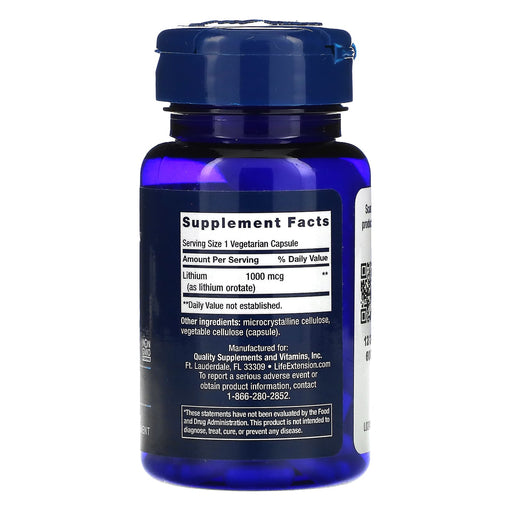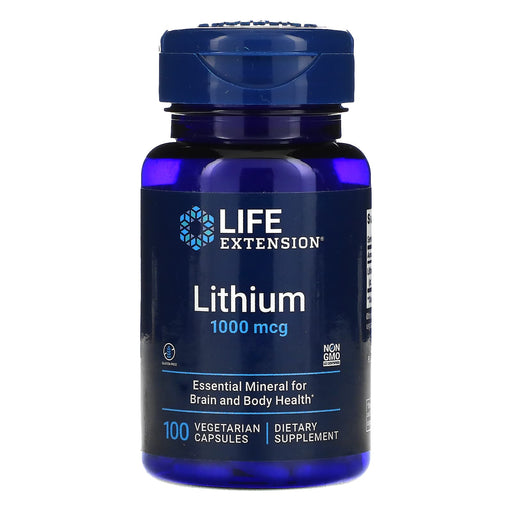
Support Your Mood, Brain Health, and Overall Well-Being with Lithium Supplements
Lithium is a naturally occurring mineral that has been used for decades in the field of mental health to support mood balance, emotional well-being, and overall brain function. While often associated with the treatment of bipolar disorder, lithium is also available in low-dose, over-the-counter supplements that can offer a range of potential benefits for mental health and beyond. By incorporating lithium supplements into your wellness routine, you can support your brain's natural balance and resilience, promoting a greater sense of emotional stability, mental clarity, and overall well-being.
The Mechanisms Behind Lithium's Mood and Brain Health Benefits
Lithium's unique properties and diverse functions in the brain make it a valuable natural tool for supporting mental health and cognitive function. Some of the key mechanisms behind lithium's benefits include:
- Neurotransmitter Regulation: Lithium has been shown to help regulate the activity of key neurotransmitters in the brain, such as serotonin and dopamine, which play crucial roles in mood, emotion, and cognitive function. By supporting the balance of these neurotransmitters, lithium may help to promote a more stable and positive mood, as well as improved mental clarity and focus.
- Neuroprotection: Lithium has been found to possess neuroprotective properties, helping to protect brain cells from oxidative stress, inflammation, and other forms of damage. This protective effect may help to support the health and longevity of brain cells, promoting overall brain health and cognitive function.
- Neural Plasticity Support: Some studies suggest that lithium may help to promote neural plasticity, the brain's ability to form new connections and adapt to new experiences. By supporting neural plasticity, lithium may help to enhance learning, memory, and overall cognitive flexibility.
- Circadian Rhythm Regulation: Lithium has been shown to influence the activity of certain genes involved in regulating the body's circadian rhythms, the natural 24-hour cycles that govern sleep, wakefulness, and other physiological processes. By supporting healthy circadian rhythms, lithium may help to promote better sleep quality, daytime alertness, and overall well-being.
The Potential Health Benefits of Lithium Supplementation
Incorporating lithium supplements into your daily routine may offer a wide range of potential health benefits, supporting various aspects of mental and emotional well-being, as well as overall brain function. Some of the key benefits of lithium supplementation include:
- Mood Support: Lithium's ability to regulate neurotransmitter activity and promote a more balanced brain chemistry may help to support a stable and positive mood, reducing the risk of mood swings, irritability, and emotional distress.
- Stress Resilience: By supporting the brain's natural coping mechanisms and promoting a more balanced stress response, lithium may help to enhance emotional resilience and improve the ability to manage stress and adversity.
- Cognitive Function: Lithium's neuroprotective and neural plasticity-enhancing properties may help to support various aspects of cognitive function, including memory, learning, attention, and mental clarity.
- Sleep Quality: By regulating circadian rhythms and promoting a more balanced sleep-wake cycle, lithium may help to improve sleep quality, duration, and overall restfulness, leading to better daytime functioning and well-being.
- Overall Brain Health: The neuroprotective and brain-supportive properties of lithium make it a valuable tool for promoting overall brain health and cognitive function, potentially reducing the risk of age-related cognitive decline and neurodegenerative disorders.
Choosing the Right Lithium Supplement
When selecting a lithium supplement, it's essential to choose a high-quality product from a reputable brand. Look for supplements that:
- Provide lithium in a safe and bioavailable form, such as lithium orotate or lithium aspartate, at a low-dose, over-the-counter strength
- Offer a clinically effective dosage, typically ranging from 5mg to 20mg of elemental lithium per day, depending on individual needs and health goals
- Are manufactured in cGMP-certified facilities to ensure purity, potency, and safety
- Are free from unnecessary additives, fillers, and allergens
- Are clearly labeled with accurate dosage information and instructions for use
As with any new supplement, it's crucial to consult with a healthcare professional before starting lithium supplementation, especially if you have a pre-existing health condition, are taking medications, or have concerns about your mental health.
Related Vitamins and Supplements
While lithium is a powerful mood and brain health supplement on its own, certain vitamins and supplements can complement its benefits and support overall mental and emotional well-being. Some relevant options to consider alongside lithium include:
- Omega-3 Fatty Acids: These essential fats, particularly EPA and DHA, support brain health, neurotransmitter function, and mood regulation, enhancing the benefits of lithium supplementation.
- B-Complex Vitamins: These vital nutrients support energy production, neurotransmitter synthesis, and overall brain function, working synergistically with lithium to promote optimal mental health.
- Magnesium: This essential mineral supports relaxation, stress management, and overall brain health, complementing the mood-stabilizing effects of lithium.
- Vitamin D: This crucial vitamin supports brain health, immune function, and overall well-being, making it a valuable addition to a mood and brain health supplement regimen.
Experience the Mood and Brain Health Benefits of Lithium Supplementation
At Health Orchard, we are dedicated to providing our customers with the highest quality lithium supplements to support mood balance, brain health, and overall well-being. Our carefully curated selection features low-dose, over-the-counter lithium products from trusted brands, formulated with safe, bioavailable, and effective ingredients for optimal results.
Whether you're looking to support a stable and positive mood, enhance stress resilience, promote cognitive function, or simply nurture your overall brain health, our lithium supplement collection has the perfect product to meet your needs.
Witness the potential of lithium supplementation and experience the difference it can make in your journey towards optimal mental and emotional well-being. Browse our selection today and take the first step towards supporting your brain's natural balance and resilience with this remarkable mineral.
Frequently Asked Questions about Lithium
1. What is lithium supplement good for?
Lithium supplements, available in low doses over the counter, are believed to offer several potential health benefits:
- Supporting mood and emotional well-being
- Promoting brain health and cognitive function
- Reducing inflammation and oxidative stress
- Supporting thyroid function
- Enhancing sleep quality
It is important to note that lithium supplements contain much lower doses than prescription lithium medications used to treat bipolar disorder and should not be used as a substitute for medical treatment without consulting a healthcare professional.
2. What are lithium tablets used for?
Lithium tablets, available as a dietary supplement, are used for various purposes:
- Promoting mood balance and emotional well-being
- Supporting brain health and cognitive function
- Reducing inflammation and oxidative stress
- Supporting thyroid function
- Enhancing sleep quality
These low-dose lithium supplements are not intended to treat any specific medical condition and should not be used as a substitute for prescription lithium medications without consulting a healthcare professional. Prescription lithium tablets, on the other hand, are primarily used to treat bipolar disorder and other mental health conditions under medical supervision.
3. How can I get lithium naturally?
Lithium is a naturally occurring element found in small amounts in various foods and water sources. Some natural sources of lithium include:
- Drinking water (varying levels depending on the source)
- Grains and vegetables (e.g., potatoes, tomatoes, cabbage)
- Dairy products and eggs
- Meat and fish
- Coffee, tea, and some soft drinks
However, the amount of lithium in these sources is generally much lower than the doses found in dietary supplements or prescription medications. It is essential to consult with a healthcare professional before attempting to increase your lithium intake through diet or supplements.
4. Is lithium safe to take daily?
Low-dose lithium supplements, when taken as directed, are generally considered safe for daily use in most people. However, it is essential to follow the recommended dosage on the product label and consult with a healthcare professional before starting any new supplement regimen, especially if you have pre-existing medical conditions or are taking medications. Some people may experience mild side effects, such as digestive discomfort or increased thirst, but these are usually rare and subside with continued use or dosage adjustment. People with kidney disease or those taking certain medications should exercise caution and consult their doctor before taking lithium supplements.
5. Is it ok to take lithium supplements?
Yes, it is generally okay to take low-dose lithium supplements, as they are available over the counter and considered safe for most people when used as directed. However, it is essential to keep in mind that lithium supplements are not intended to diagnose, treat, cure, or prevent any disease and should not be used as a substitute for medical treatment or advice. If you are considering taking lithium supplements for a specific health concern, consult with a healthcare professional to determine if they are appropriate for your individual needs and to ensure safety.
6. Who should not take lithium?
While low-dose lithium supplements are generally safe for most people, certain individuals should exercise caution or avoid taking lithium:
- People with kidney disease or impaired kidney function
- Individuals taking medications that can interact with lithium (e.g., NSAIDs, diuretics)
- Pregnant or breastfeeding women (due to limited safety data)
- People with thyroid disorders (lithium may affect thyroid function)
- Individuals with cardiovascular disease or abnormal heart rhythms
- People with severe dehydration or sodium imbalances
If you have any pre-existing medical conditions or are taking medications, consult with a healthcare professional before taking lithium supplements to ensure safety and avoid potential interactions.
7. What is the biggest side effect of lithium?
The biggest side effect of lithium, particularly at high doses used in prescription medications for bipolar disorder, is lithium toxicity. Symptoms of lithium toxicity may include:
- Nausea, vomiting, and diarrhea
- Tremors, muscle weakness, and twitching
- Confusion, disorientation, and impaired consciousness
- Irregular heartbeat and low blood pressure
- Seizures and coma (in severe cases)
Lithium toxicity is more likely to occur with prescription lithium medications, which require regular blood tests and close medical supervision to ensure safe and effective use. Low-dose lithium supplements, when taken as directed, have a much lower risk of toxicity but may still cause mild side effects such as digestive discomfort, increased thirst, or mild tremors in some people.










